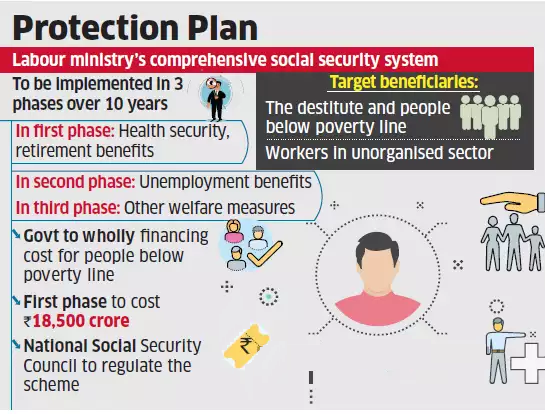Social Justice
Universal Social Security
This article is based on “India needs a universal social security system” which was published in The Hindustan Times on 08/07/2020. It talks about the need for universal social security in India.
The lockdown necessitated by the Covid-19 pandemic has caused misery to almost all sections of society, but the vulnerable section viz. people below the poverty line, migrant workers have been affected the most.
Further, the principle of Universality of social security is enshrined in various goals related to the 2030 Agenda for Sustainable Development. In this context, the imperative of providing universal social security, has assumed much significance.
What is the Social Security System?
- According to the International Labour Organisation (ILO), Social Security is a comprehensive approach designed to prevent deprivation, give assurance to the individual of a basic minimum income for himself and his dependents and to protect the individual from any uncertainties.
- It is also comprised of two elements, namely:
- Right to a Standard of Living adequate for the health and well-being, including food, clothing, housing and medical care and necessary social services.
- Right to Income Security in the event of unemployment, sickness, disability, widowhood, old age or other lack of livelihood in circumstances beyond any person’s control.
Need For Universal Social Security in India
- Majority of WorkForce is in Unorganised Sector: The organised sector workers constitute less than 10% of all workers in India.
- This leaves more than 90% of the workforce without job security, labour rights and post-retirement provisions.
- Also, in a dynamic market-economy, workers will lose jobs at a faster pace with technological changes. Thus, workers need to keep learning to stay productively employed.
- However, in spite of great attention given to skills development in the last 15 years, the results are not very encouraging.
- Too Expensive Private Healthcare Expense: Out-of-pocket health expenses, which create barriers to seeking healthcare and can push marginal households into poverty, form as much as nearly 90% of private expenditure on health.
- Also Covid-19 has highlighted the urgency for providing universal free health care. It has demonstrated that private health care can be afforded only by the wealthy.
- Inadequate Expenditure on Social Security: India has a broad aim of social protection programs, but the overall public expenditure on social protection (excluding public healthcare) is only approx. 1.5% of the GDP, lower than many middle-income countries across the world.
Steps To Implement Universal Social System
Extending MGNREGA to Urban Areas
- MGNREGA has proved its utility by providing employment to millions of workers who have reverse migrated.
- Thus, there is a case for extending this programme to urban areas with municipal bodies being given the responsibility for providing a fixed no of days work to all those seeking it.
- Municipal bodies have a range of work to get done, such as improving sanitation, minor repairs, in which they could productively use labour.
- Also, a MGNREGA scheme in urban areas can be framed to attach on-the-job skill development.
Skill Development via ‘Learning while Earning’ Model
- The principle of “learning while earning” should be more vigorously applied to improve India’s skill development systems.
- The best way to learn useful skills is on the job, supplemented with off-line modules, which has been the successful approach of governments and employers in Germany and Japan.
- The principle of on-the-job learning supplemented with government-supported training can be applied in clusters of small and medium enterprises.
- That way, not only can physical infrastructure be improved in rural and urban areas, but human capabilities will also be simultaneously developed.
Providing Universal Health Coverage
- There is a need to establish the Ayushman Bharat-National Health Agency at all levels of governance for management of the Pradhan Mantri Jan Aarogya Yojana (PM-JAY).
- Also, greater autonomy to public hospitals is required to use claims money generated under PM-JAY to improve facilities, purchase the necessary drugs/tests and provide performance-based incentives to staff.
- There is a need to review and iron out the challenges with the business model of Jan Aushadhi stores to ensure that they can function as self-sustaining entities and scale up rapidly across the country.
- The State must also provide the infrastructure and make doctors and facilities accessible.
- Digital technologies, telemedicine, pharmacy chains of generic drugs, promotion of healthier lifestyles, and greater use of trained nurses and paramedics can improve health care and lower costs dramatically.
- In this context, the target of raising the share of expenditure on health care to 2.5% of the GDP, as envisaged by the National health policy 2017, in the next two years would be a good beginning.
Conclusion
The need for a Universal social security is also highlighted by the various provisions under Indian constitution, like Directive Principles of State Policy, which envisages the State to provide public assistance to all sections of society, including vulnerable sections.
|
Drishti Mains Question Income support with skill improvement and good health care for all, are essential for a universal social security system in India. Discuss. |
This editorial is based on “None gains: On U.S. withdrawal from WHO” which was published in The Hindu on July 10th, 2020. Now watch this on our Youtube channel.





